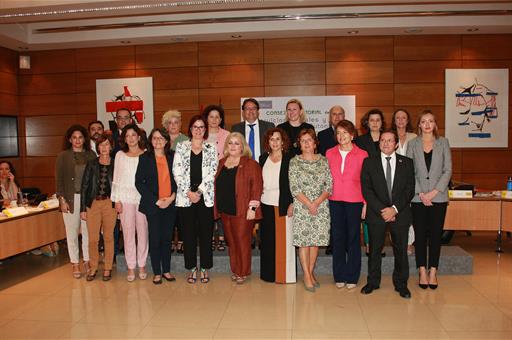Plenary session of the Territorial Council for Social Services and Long-Term Care
Government and regional governments approve distribution of 214 million euros to regional governments for social subsidies charged to 0.7% contribution under personal income tax
News - 2019.10.10
The State Secretary for Social Services, Ana Lima, chaired the Territorial Council for Social Services and Long-Term Care, at which the distribution of 214.5 million euros was approved corresponding to the regional tranche of subsidies charged to the 0.7% contribution under personal income tax.
These funds are distributed among the regional governments and regional cities of Ceuta and Melilla, so that they can in turn finance programmes of social interest within their respective jurisdictions. These are subsidies earmarked to cater for poverty and social exclusion.
The distribution was made according to the criteria unanimously agreed by the regional governments and the ministerial department at the previous meeting of the Territorial Council in March.
This amount corresponds to 81.14% of the funds obtained through the collection of the 0.7% contribution under the 2018 personal income tax campaign, corresponding to the financial year 2017. This amount is 11.8 million euros more than last year.
The remaining 18.86% corresponds to the part that the State distributes as subsidies to State entities to develop social activities. In total, the collection under the Solidarity X box ticked on the 2018 personal income tax returns amounts to 264.4 million euros, 12.4 million euros up (5%) on the previous year.
Nacional Alzheimer's Plan
The government and the regional governments also approved the National Alzheimer's Plan 2019-2023, which contains the goals and cross-cutting measures to improve the diagnosis of the disease, care for those affected and for the family members that look after them.
The plan contains four main pillars of action. First, awareness and the transformation of the environment with the aim of changing the perspective that society has of Alzheimer's. Second, it seeks to place people at the heart of healthcare and social care. To achieve that, policies will be developed to promote health and awareness of the risk factors will be spread among the population and professionals, along with the most suitable treatments.
The third pillar focuses on the law, ethics and the dignity of people, and seeks to improve the services, support and benefits to enhance care for people in different areas. Lastly, the fourth pillar focuses on measures to enhance research, innovation and knowledge.
The plan was drawn up with extensive participation at different levels, including the State Group for Dementias. It also included input from the main foundations, scientific societies, professional organisations and institutes, and research centres, as well as the Attorney General's Office. The associative movement of families of people with Alzheimer's and other dementias was also involved.
International adoption
The ministerial department and regional governments also approved a new standard form contract for intermediation in international adoption processes. This modification thus complies with the Royal Decree approved on 22 March by the Council of Ministers, which establishes that there must be only one standard form contract between adoptive families and Adoption Accredited Bodies (AAB) and one set of fees for the procedures. Accordingly, this would comply with the principles of equality and legal certainty.
The new standard form establishes that each contract will refer to a country and an accredited body. There will also be a common part and an economic part differentiated according to the country of origin and to the AAB. Another of the new features is that each family will have, upon signing the contract, a basic estimate of the total cost of the process.
For their part, the AAB will have certain flexibility when configuring their payments and a quota system will be established that fosters their survival. The standard form contract also guarantees the application of the Data Protection Act.
On another note, the suspension on the processing of the adoption of children without special needs in Vietnam has been lifted.
Brexit
 Ministerio de Sanidad, Consumo y Bienestar SocialWith the aim of further developing coordination between regional governments and the ministry in the field of social services, the plenary session of the Territorial Council for Social Services and Long-Term Care also agreed to set up a working group to monitor potential repercussions from Brexit that may arise in relation to the jurisdiction held by regional governments on social services, family welfare and child welfare.
Ministerio de Sanidad, Consumo y Bienestar SocialWith the aim of further developing coordination between regional governments and the ministry in the field of social services, the plenary session of the Territorial Council for Social Services and Long-Term Care also agreed to set up a working group to monitor potential repercussions from Brexit that may arise in relation to the jurisdiction held by regional governments on social services, family welfare and child welfare.
This group is set up within the framework of the Delegate Social Services Committees and the System for Autonomy and Long-Term Care (Spanish acronym: SAAD) and is comprised of representatives from Central Government and the regional governments. The participation of the Spanish Federation of Municipalities and Provinces, the Ministry of Territorial Policy and Public Function and the Ministry of Foreign Affairs, European Union and Cooperation has also been mooted.
Foster care
The ministry and regional governments agreed to the criteria for the common cover, quality and accessibility for foster care with families and at residential centres for minors. The aim is to harmonise actions in different autonomous regions, improve coordination and raise quality standards.
In the case of family foster care, the technical document includes an aptitude assessment, economic compensation and the encouragement of family foster care and associationism. These three pillars develop the quality standards agreed with all the public bodies in all the phases of the process of family foster care.
In the case of residential foster care, the document is structured in four parts: resources, the basic processes, needs and well-being, and management and organisation.
Furthermore, for the first time, a common framework has been established for quality standards under short-term stay programmes for foreign minors. The technical document establishes, inter alia, the monitoring and coordination procedures. It also determines the requirements and good practices for application for fostering by both individuals and legal entities.
Non official translation





